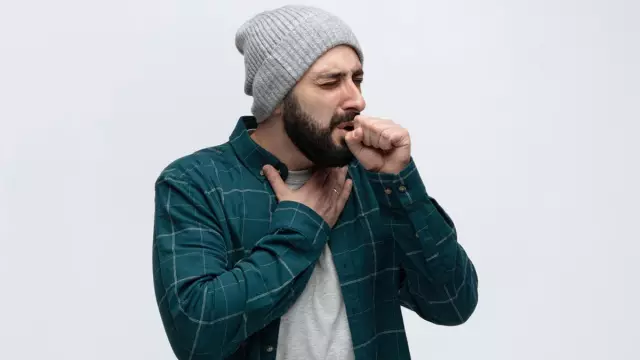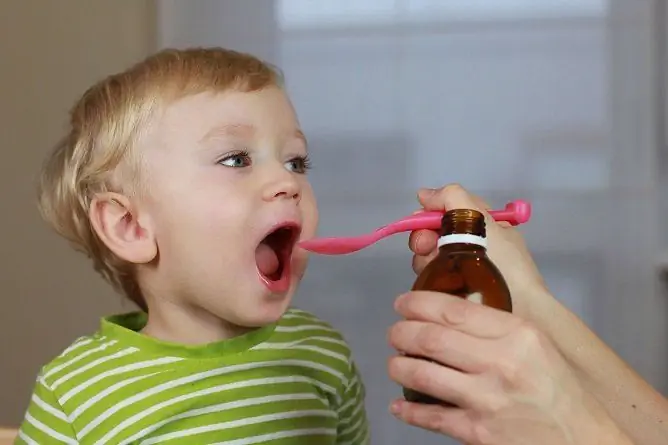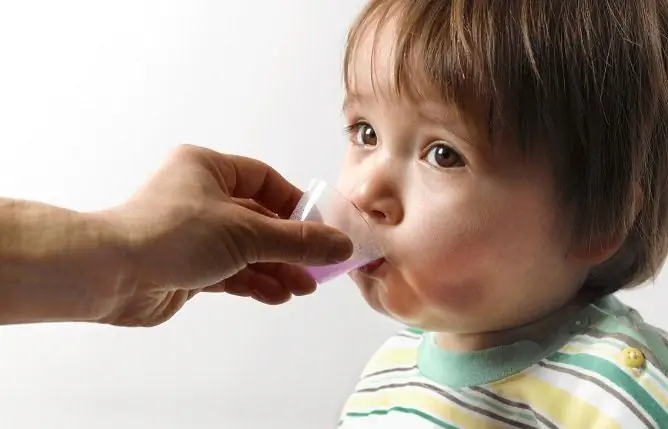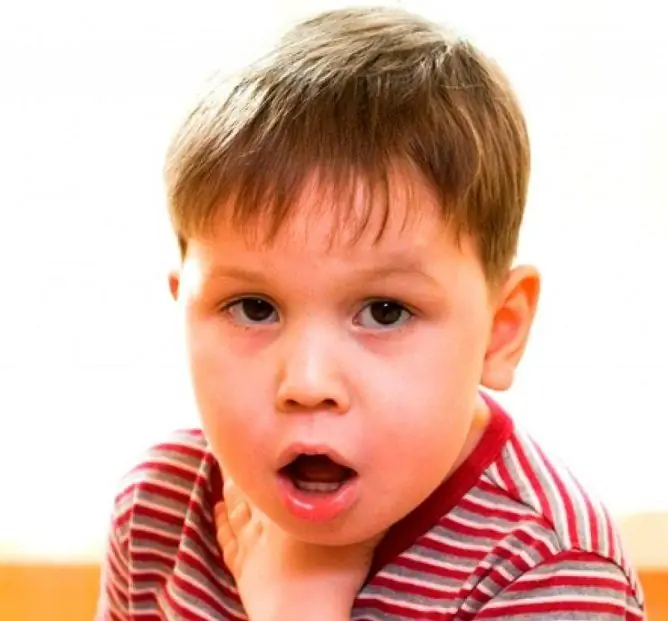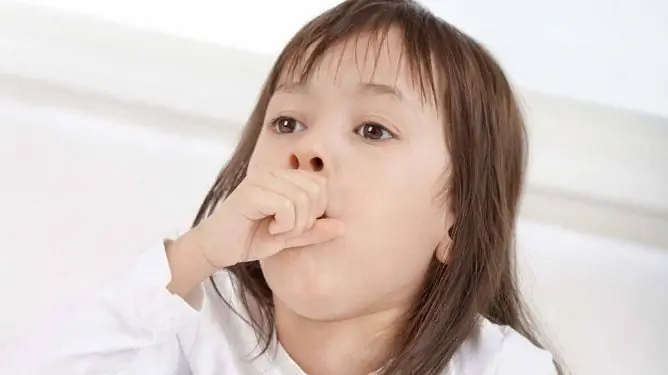- Author Rachel Wainwright [email protected].
- Public 2023-12-15 07:39.
- Last modified 2025-11-02 20:14.
Child's cough

A child's cough is a protective reaction of the child's body in the form of an explosive, sharp breath, aimed at eliminating foreign bodies, sputum, harmful microorganisms and dust from the respiratory tract. Cough receptors can irritate fluctuations in humidity and temperature in the air inhaled by a child, as well as papillomas, tumors, allergens, and foreign bodies in the respiratory tract. A rare cough in a child during the day is physiological. The cough thrusts remove the accumulation of saliva and mucus before entering the larynx. Children between the ages of eight and twelve can normally cough three to ten times a day.
Types of cough in a child
The cough is necessary. Without it, even minor airway inflammation would lead to pneumonia. But only that type of cough clears the airways, which is accompanied by the release of mucus, sputum. This is the so-called wet or productive cough.
Other types of cough (paroxysmal, dry, barking cough) are not helpful. They prevent the child from sleeping, tire him out and can even cause vomiting.
An unproductive (dry) cough in a child is considered the most intrusive. A dry cough does not contribute to the discharge of sputum, since it occurs at the initial stage of inflammation of the mucous membranes, when there is practically no sputum.
A barking cough in a child usually occurs with tracheitis and laryngitis. It is associated with changes in the vocal cords. A child's barking cough must be "softened" with anti-inflammatory sprays, lozenges and alkaline drinks.
A moist cough occurs as phlegm accumulates. Most often, a wet cough is observed with bronchitis.
With whooping cough, his attacks follow one after the other, bringing the body to exhaustion.
A staccato cough develops with respiratory chlamydia in newborns. Staccato cough - ringing, abrupt, dry. It quickly disappears when treating the underlying disease.
Spasmodic cough is obsessive, not very productive. Usually has a whistling sound at the end. With a spastic cough, it is useless to take antitussives.
Bitonal cough (low and then high tone) can occur when large foreign bodies enter the bronchi.
A cough with a deep breath occurs with an attack of bronchial asthma. Most often, this type of cough is accompanied by pain.
Cough when eating occurs with diseases of the esophagus and stomach.
A psychogenic cough in a child can occur during stressful situations in school and family. A psychogenic cough appears only during the day and disappears at night. The features of this type of cough include regularity, high frequency and a metallic echo.
How to treat a child's cough?

With a dry cough, the child cannot get rid of the mucus that has accumulated in the bronchi. Various cough syrups for children are used to thin phlegm, soothe cough syndrome and suppress coughs. Children usually happily take cough syrups as most of these syrups taste good. Give cough syrup only after consulting your doctor.
Cough syrups for children with plantain, with ivy extract are effective antitussive drugs. Ambrobene cough syrup for children can be used to treat newborn babies. This syrup not only relieves inflammation, but also enhances local immunity. For the treatment of dry cough, pediatricians often prescribe Lazolvan syrup. The principle of this syrup is similar to Ambrobene syrup. The Doctor MOM cough syrup, based on extracts of licorice roots, basil, extracts of aloe, ginger, nightshade and other plants, has also proven itself excellent. Any cough medicine cannot be used for a long time, as in this case they can only intensify the cough.
A dry cough is greatly facilitated by steam inhalation. For inhalation, you can prepare a solution of drinking soda or alkaline mineral waters. Massage of reflex zones and chest helps with coughing.
When a child has a dry cough, it is very important to humidify the air in the room. For this it is necessary to carry out wet cleaning. You can also place a pot of boiling water on top of the radiator, or place a wet towel. The air temperature in the room where the child is located should not exceed 20-22 C. With a dry cough, the child must drink a lot.
When coughing, it is also helpful to feed your child with mashed potatoes with milk and ghee. A warming compress on the chest area will help relieve a coughing attack.
A child should be seen by a doctor if the cough persists after all other signs of the disease disappear, if the cough is sudden and convulsive. Consultation with a pediatrician is necessary if the cough prevents the baby from sleeping normally, if during coughing attacks the child turns blue or turns very pale, and his breathing is difficult, if, in addition to coughing, the child has an increase in body temperature.
YouTube video related to the article:
The information is generalized and provided for informational purposes only. At the first sign of illness, see your doctor. Self-medication is hazardous to health!

